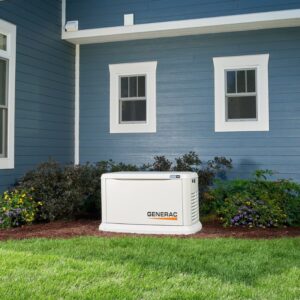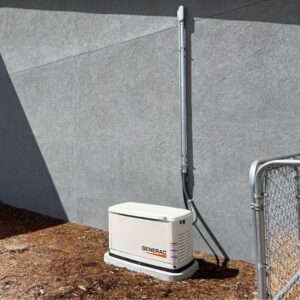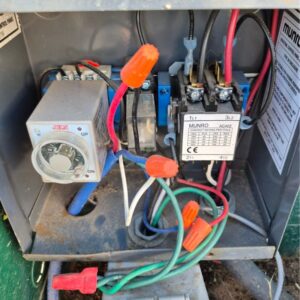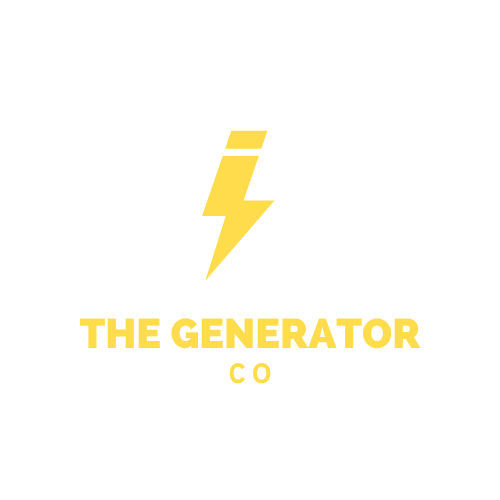
When a power outage hits, a whole-house generator can be the difference between comfort and chaos.
These standby generators automatically restore electricity to your home—keeping your lights, HVAC system, and appliances running until grid power returns.
But how long do whole-house generators last before you need to replace them?
With regular maintenance and proper installation, a whole-house generator can last 20 to 30 years, or roughly 3,000 to 5,000 hours of run time.
Several factors influence that lifespan, including fuel type, usage frequency, and environmental conditions. Here’s what you need to know to make your investment last decades.
Average Lifespan of Whole-House Generators
Most whole-house generators are designed for longevity, especially when maintained by professionals. The average lifespan depends on the fuel source and how often the unit runs.
| Generator Type | Average Lifespan | Average Run Time (Hours) |
|---|---|---|
| Natural Gas Generators | 20–25 years | 3,000–5,000 hours |
| Propane Generators | 20–30 years | 3,000–6,000 hours |
| Diesel Generators | 25–30 years | 5,000–10,000 hours |
| Portable Generators (for comparison) | 10 years | 1,000–2,000 hours |
If properly installed with the right transfer switch and fuel supply, a standby generator can run continuously for days at a time—providing reliable backup power during extended outages. However, long run times without inspection or maintenance can shorten lifespan.
What Affects the Lifespan of a Home Generator?
Every home generator has moving parts that wear down over time, but several key factors determine whether it lasts 10 years or 30.
1. Regular Maintenance
Routine service is essential for performance and safety. This includes:
- Changing oil, air, and fuel filters
- Checking the fuel tanks and fuel lines for leaks
- Testing the transfer switch for proper operation
- Cleaning spark plugs and battery terminals
Skipping maintenance increases wear, reduces fuel efficiency, and can cause unexpected breakdowns during power outages.
Tip: Schedule annual maintenance with a certified technician and run monthly self-tests to keep the system ready for any emergency.
2. Fuel Type and Quality
The fuel type you choose directly affects how long your generator lasts.

- Natural gas generators are the most convenient for homes connected to gas lines, requiring no refueling.
- Propane generators burn cleanly, making them ideal in rural areas or where natural gas isn’t available.
- Diesel units are extremely durable but need extra care to prevent fuel contamination.
Always use clean, high-quality fuel and keep fuel tanks stored properly. Contaminated or old fuel can clog injectors and reduce the generator’s lifespan.
3. Load and Usage Frequency
Generators last longer when operated within their ideal load range—typically 70–80% capacity. Running your generator at full load for long periods causes unnecessary strain, while running it with too little demand can cause wet stacking (a buildup of unburned fuel in the exhaust).
If you’ve recently added new appliances or an EV charger, it might be time to evaluate whether your system can still handle your home’s electrical demand efficiently.
4. Installation Quality
A professionally installed standby generator ensures proper airflow, wiring, and grounding. Improper installation can lead to vibration damage, poor fuel efficiency, or even electrical hazards. Always use a licensed installer familiar with your brand—especially if it’s a Generac or similar high-end model.
Get your generator installed by professionals.
5. Environmental Conditions
Colorado’s weather—snow, dust, and freezing temperatures—can reduce a generator’s lifespan. Install a weatherproof enclosure and keep the unit clear of debris to protect moving parts and ensure ventilation. A clean, dry system lasts longer and delivers peace of mind during every storm.
How to Extend the Life of Your Whole-House Generator
The good news: with the right care, your generator can easily outlast its warranty. Follow these steps to add years of dependable performance.
1. Run the Generator Regularly
Most modern standby generators perform weekly or biweekly self-tests to ensure readiness. Regular operation keeps fluids circulating and lubricates internal components, so your generator can run continuously when it matters most.
2. Monitor Runtime Hours
Track the total run time through your control panel or smart monitoring app. When the total runtime nears 3,000–5,000 hours, start preparing for a replacement to avoid unexpected failure during a power outage.
3. Keep It Clean
Dust and debris can restrict airflow. Clean around the vents, check for pest nests, and make sure no snow or leaves block the cooling system. Proper ventilation prevents overheating and improves fuel efficiency.
4. Check the Fuel System
Inspect the fuel supply, fuel tanks, and gas lines periodically. Leaks or contamination can damage your engine or cause shutdowns during emergency power events.
5. Schedule Professional Inspections
Have a licensed generator technician perform an annual checkup. They’ll inspect the transfer switch, check voltage output, and test load capacity to ensure safe, efficient operation.
Example Maintenance Schedule
| Task | Frequency |
|---|---|
| Check oil level | Monthly or after each use |
| Replace oil and filters | Every 100–200 hours or annually |
| Replace air filter | Annually |
| Test transfer switch | Annually |
| Inspect spark plugs | Annually |
| Inspect fuel lines and tanks | Every 6 months |
| Full professional inspection | Once per year |
Keeping up with this schedule can extend your generator’s life by 5–10 years—and give you long-term peace of mind knowing your system will perform during any power outage.
Signs Your Whole-House Generator May Need Replacement
Even the most durable home generator won’t last forever. Look out for these signs that it’s nearing the end of its lifespan:

- Hard starting or frequent stalling
- Inconsistent power output
- Noticeable vibration or noise
- Increased fuel consumption
- Visible corrosion or leaks
- Frequent system faults or shutdowns
If your unit shows multiple signs or is more than 20 years old, consult a technician. Newer models are quieter, more fuel efficient, and feature smart diagnostics to monitor health automatically.
How Long Do Generac Whole-House Generators Last?
Generac is one of the most trusted names in standby generators. A Generac whole-house generator typically lasts 25 to 30 years with proper maintenance. These systems are designed for heavy use and optimized fuel efficiency.
To extend life expectancy:
- Register your warranty
- Schedule service through a certified Generac provider
- Use manufacturer-approved parts and oil
When maintained correctly, your Generac unit can provide decades of reliable backup power—ensuring your home stays protected during every power outage.
Final Thoughts
So, how long do whole-house generators last?
With proper installation, regular maintenance, and smart operation, your home generator can easily provide emergency power for 20–30 years.
Whether you rely on natural gas generators connected to gas lines or propane generators for off-grid reliability, the key is upkeep. A professionally installed and well-maintained system guarantees long-term peace of mind, efficiency, and dependable performance—no matter what the weather brings.
Schedule Your Generator Maintenance Today
Keep your system ready when you need it most.
Contact our team for yearly inspections, service plans, or installation of a new standby generator.
We’ll make sure your generator remains your most reliable backup power source for decades to come.
October 31, 2025
